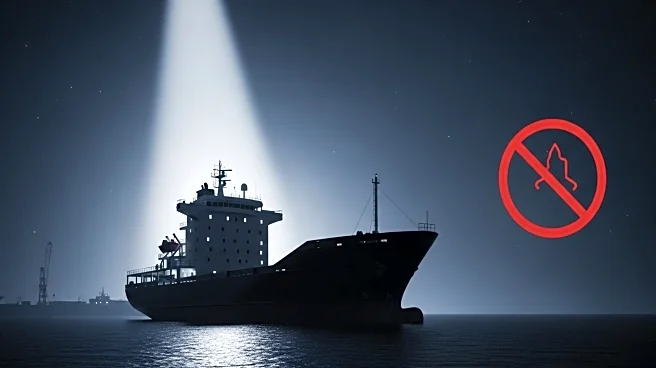What is the story about?
What's Happening?
The Trump administration has announced new sanctions targeting 50 individuals, companies, and ships, primarily based in the United Arab Emirates, Hong Kong, and China. These entities are accused of facilitating the shipment of Iranian oil and sales of liquefied petroleum gas, which are crucial to Iran's ability to export petroleum products. The sanctions include measures against two dozen 'shadow fleet' ships, a China-based crude oil terminal, and a non-state-owned Chinese refinery. These actions are part of President Trump's executive orders aimed at reducing Iran's oil exports to zero. The sanctions restrict access to U.S. property and financial assets for the targeted entities and prohibit U.S. businesses and citizens from engaging in transactions with them.
Why It's Important?
These sanctions are a continuation of the Trump administration's 'maximum pressure' strategy on Iran, intended to curb Tehran's access to nuclear weapons and disrupt its ability to fund terrorist groups. The sanctions are expected to further strain Iran's economy, which is already under pressure due to the reimposition of United Nations sanctions over its nuclear program. Iran's currency, the rial, is at a record low, exacerbating food price increases and daily life challenges for its citizens. The sanctions could also impact global oil markets, as they target significant players in the Iranian oil trade.
What's Next?
The sanctions are likely to provoke responses from the affected countries and entities, particularly those in China and the UAE. The international community may see increased diplomatic tensions as these countries navigate the implications of the U.S. sanctions. Additionally, Iran may seek alternative methods to circumvent these restrictions, potentially leading to further geopolitical instability in the region. The U.S. may continue to monitor and impose additional sanctions as part of its strategy to pressure Iran.
Beyond the Headlines
The sanctions highlight the complex interplay between international diplomacy and economic policy. They underscore the ethical and legal challenges of enforcing international sanctions, particularly when they affect global trade and economic stability. The long-term impact on U.S.-China relations and the broader geopolitical landscape remains uncertain, as both countries have significant stakes in the global oil market.
















